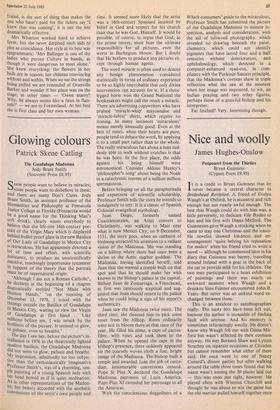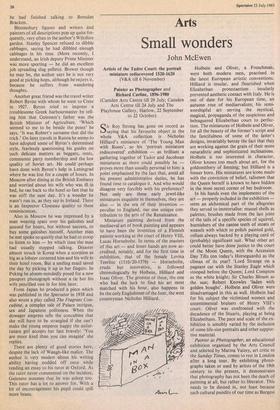Nice and woolly
James Hughes-Onslow
Potpourri from the Thirties Bryan Guinness (Cygnet Press £9.95)
It is a credit to Bryan Guinness that he never became a central character in Brideshead Revisited. A friend of Evelyn Waugh's at Oxford, he is eccentric and rich enough but not nearly awful enough. The best that Waugh could do with him was, a little perversely, to dedicate Vile Bodies to him and his first wife Diana Mitford. The Guinnesses gave Waugh a stocking when he came to stay one Christmas and the irasci- ble novelist showed kindness and en- couragement 'quite belying his reputation for malice' when his friend tried to write a novel — although he commented later in his diary that Guinness was barmy, travelling around Ireland with a goat in the back of the car to provide milk for his children. The two men participated in a hoax exhibition of paintings and there was nearly an awkward moment when Waugh and a drunken Sinn Feinner encountered John B. Yeats. But never was an unkind word ex- changed between them.
This is an antidote to autobiographies really. The nasty bits have been left out, because the author is incapable of finding fault with anyone. And his memory is sometimes infuriatingly woolly. He doesn't know why Waugh fell out with Diana Mit- ford but wasn't affected by their coolness anyway. He met Bernard Shaw and Lytton Strachey on separate occasions at Cliveden but cannot remember what either of them said. He once went to one of Nancy Cunard's dinner parties but after walking around the table three times found that his name wasn't among the 30 places laid out — this was soon put right, however. He played chess with Winston Churchill and thought he was about to win the game but the old warrior pulled himself together once he had finished talking to Brendan Bracken.
Bloomsbury figures and writers and painters of all descriptions pop up quite fre- quently, very often in the author's Wiltshire garden. Stanley Spencer refused to dibble cabbages, saying he had dibbled enough cabbages in his time. (More recently, I understand, an Irish deputy Prime Minister was more sporting — he did an excellent job spreading slug pellets). Brewer though he may be, the author says he is not very good at picking hops, although he enjoys it, because he suffers from wandering thoughts.
Another great friend was the travel writer Robert Byron with whom he went to Crete in 1927. Byron tried to impress a troublesome Greek harbourmaster by tell- ing him that Guinness's father was the British Minister of Agriculture. 'Which seemed to me to be beside the point' he says. 'It was Robert's surname that did the trick.' On later travels in Russia he seems to have adopted some of Byron's determined style, fearlessly questioning his guides on such delicate matters as beggars, rents, communist party membership and the low quality of Soviet art. He could perhaps have done with Byron's help in Leningrad where he was lost for a couple of hours. In Moscow after dining at the British Embassy and worried about his wife who was ill in bed, he ran back to the hotel so fast that he was stiff the next day. It's a wonder he wasn't run in, as they say in Ireland. There is an Inspector Clouseau quality to these reminiscences.
Also in Moscow he was impressed by a man wearing spats over his galoshes and queued for hours, but without success, to buy some galoshes himself. Another man he met spoke so quietly that he had to stoop to listen to him — by which time the man had usually stopped talking. Disaster almost struck in Korea when a scorpion as big as a lobster cornered him and his wife in their hotel room. But a smiling maid saved the day by picking it up in her fingers. In Peking he absent-mindedly posed for a new passport photograph without a tie but his wife pencilled one in for him later.
From Japan he produced a piece which was published in the Spectator in 1938 and also wrote a play called The Fragrant Con- cubine, a complex tale of Palace intrigue,
sex and Japanese politeness. When the dowager empress tells the concubine that she will have to be strangled if she can't make the young emperor happy the unfor- tunate girl accepts her fate bravely: 'You are more kind than you can imagine' she replies.
There are plenty of good stories here, despite the lack of Waugh-like malice. The author is very modest about his writing ability having nodded off once while reading an essay to his tutor at Oxford. As the tutor never commented on the incident, Guinness assumes that he was asleep too. This tutor has a lot to answer for. With a bit of encouragement his pupil could spill more beans.







































 Previous page
Previous page